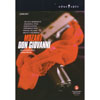Mozart Don Giovanni
Calixto Bieito’s Giovanni – the staging that scandalised London
View record and artist detailsRecord and Artist Details
Composer or Director: Wolfgang Amadeus Mozart
Genre:
Opera
Label: Opus Arte
Magazine Review Date: 10/2006
Media Format: Digital Versatile Disc
Media Runtime: 156
Mastering:
Stereo
Catalogue Number: OA0921D

Tracks:
| Composition | Artist Credit |
|---|---|
| Don Giovanni |
Wolfgang Amadeus Mozart, Composer
Anatoly Kocherga, Commendatore, Bass Bertrand de Billy, Conductor Felipe Bou, Masetto, Bass Kwangchul Youn, Leporello, Bass Marcel Reijans, Don Ottavio, Tenor Marisa Martins, Zerlina, Soprano Orchestra Academy of the Gran Teatre del Liceu Palau de la Música Catalana Chamber Choir Regina Schorg, Donna Anna, Soprano Véronique Gens, Donna Elvira, Soprano Wojciech Drabowicz, Don Giovanni, Baritone Wolfgang Amadeus Mozart, Composer |
Author: Mike Ashman
Calixto Bieito’s staging of Mozart’s opera buffa caused something close to apoplexy among the more conservative daily newspapers when it appeared at the London Coliseum in the early 2000s. Was this because, like Da Ponte’s libretto, the Catalan director’s vision of the last hours in the life of the “extremely licentious”, not-very-noble man is set in a contemporary world of sex, violence, remorse and social and psychological breakdown?
The crises that bind these characters’ lives together are explored with unflinching directness. Regina Schorg’s virtuoso Donna Anna, happily bonking Wojtek Drabowicz’s charismatic, sleazy Giovanni in the back seat of her father’s car (Kwangchul Youn’s infectiously energetic Leporello is the chauffeur), has to call out her boring, safe boyfriend Don Ottavio (Marcel Reijans, superb playing Mr Nobody) when Giovanni slashes out too hard at interfering daddy (Anatoly Kocherga, a busman’s holiday from his noted Boris). Mozart hints at all kind of hidden dangers as Anna makes Ottavio swear to avenge her; Bieito suggests that she’s trading sex for a cover-up of the fatal accident that her actions provoked. The always tricky Ottavio/Anna relationship continues in this vein (her invention of what happened with Giovanni before “Non mi dir” is another tease), via Anna’s bitchy frustration when she realises (Act 1 Quartet) that Elvira (Veronique Gens) was an event in Giovanni’s life, up to the point when Ottavio gains some small satisfaction (but almost by force) in her second aria.
I’ve concentrated on one relationship to give a flavour of Bieito’s approach. There are any number of other illuminations – the Giovanni/Leporello hierarchy of control/exploitation/need; the tabloid, Ibiza clubworld of Masetto and Zerlina; Gens’s terrifyingly complete portrait of a woman who loves too much; the convincing resituating in today’s clothes of a world where indulgent caprice and exploitation can literally destroy people’s lives. This, then, is no concert in costume but, even if you think you prefer your Don Giovanni as a clone of Errol Flynn’s 1930s Elizabethan movies, I urge you to try this serious, black and often wickedly funny piece of theatre.
The musical performance has its own distinction, as well as complete integration with the staging concept. If “old” clothes are de rigueur in your home theatre, then Peter Hall/Bernard Haitink (ArtHaus) is the sharpest of the period pieces. But the three radical Giovannis now on DVD – Deborah Warner at Glyndebourne (NVC, A/00) and Peter Sellars on film (Decca) are the other two – offer more dangerous and challenging viewing and listening.
The crises that bind these characters’ lives together are explored with unflinching directness. Regina Schorg’s virtuoso Donna Anna, happily bonking Wojtek Drabowicz’s charismatic, sleazy Giovanni in the back seat of her father’s car (Kwangchul Youn’s infectiously energetic Leporello is the chauffeur), has to call out her boring, safe boyfriend Don Ottavio (Marcel Reijans, superb playing Mr Nobody) when Giovanni slashes out too hard at interfering daddy (Anatoly Kocherga, a busman’s holiday from his noted Boris). Mozart hints at all kind of hidden dangers as Anna makes Ottavio swear to avenge her; Bieito suggests that she’s trading sex for a cover-up of the fatal accident that her actions provoked. The always tricky Ottavio/Anna relationship continues in this vein (her invention of what happened with Giovanni before “Non mi dir” is another tease), via Anna’s bitchy frustration when she realises (Act 1 Quartet) that Elvira (Veronique Gens) was an event in Giovanni’s life, up to the point when Ottavio gains some small satisfaction (but almost by force) in her second aria.
I’ve concentrated on one relationship to give a flavour of Bieito’s approach. There are any number of other illuminations – the Giovanni/Leporello hierarchy of control/exploitation/need; the tabloid, Ibiza clubworld of Masetto and Zerlina; Gens’s terrifyingly complete portrait of a woman who loves too much; the convincing resituating in today’s clothes of a world where indulgent caprice and exploitation can literally destroy people’s lives. This, then, is no concert in costume but, even if you think you prefer your Don Giovanni as a clone of Errol Flynn’s 1930s Elizabethan movies, I urge you to try this serious, black and often wickedly funny piece of theatre.
The musical performance has its own distinction, as well as complete integration with the staging concept. If “old” clothes are de rigueur in your home theatre, then Peter Hall/Bernard Haitink (ArtHaus) is the sharpest of the period pieces. But the three radical Giovannis now on DVD – Deborah Warner at Glyndebourne (NVC, A/00) and Peter Sellars on film (Decca) are the other two – offer more dangerous and challenging viewing and listening.
Discover the world's largest classical music catalogue with Presto Music.

Gramophone Digital Club
- Digital Edition
- Digital Archive
- Reviews Database
- Full website access
From £8.75 / month
Subscribe
Gramophone Full Club
- Print Edition
- Digital Edition
- Digital Archive
- Reviews Database
- Full website access
From £11.00 / month
Subscribe
If you are a library, university or other organisation that would be interested in an institutional subscription to Gramophone please click here for further information.




